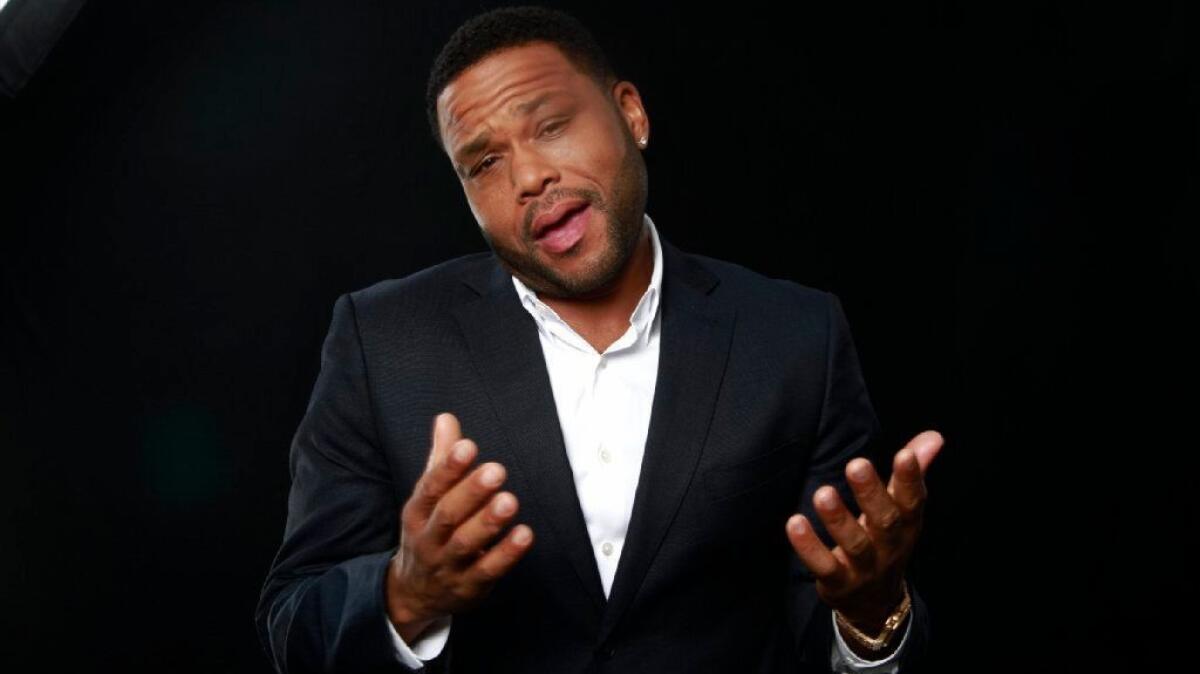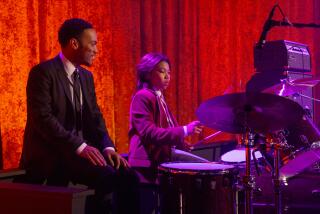Anthony Anderson keeps it real on âblack-ish,â except for the time he made his son take the fall

Get Anthony Anderson going and the voluble âblack-ishâ star will keep on going. The actor, who also serves as a co-executive producer on the ABC series, received his third consecutive Emmy nomination last month for portraying patriarch Dre Johnson.
We recently sat down with Anderson to talk about how âblack-ishâ manages to find a balance between serious, topical issues and laugh-out loud funny family moments and how the classic Norman Lear sitcoms of the â70s serve as a guide.
I wanted to talk first about Dreâs evolution because Iâm proud of Dre.
Has there been? Please share with me.
He is starting to think of others before he thinks of himself, sometimes.
Oh, well, I have you fooled. Dre has you fooled.
For me, the real pivotal thing was when Zoey (Yara Shahidi) went to look at schools, and you and Bow were just like, âOh, God, our baby is going away.â But eventually you came to your senses, which Dre often does, but I feel like he comes to his senses sooner and with more enlightenment this season. Is that just natural evolution?
With that particular episode, he had to have some sensibilities and be sensible and sensitive to, you know, his baby, his first-born, his best friend leaving the nest, and him not wanting her to fly far away from that nest. So yeah, it is a natural evolution.
I love that, over the course of the show, you and series creator Kenya Barris have drawn from your real lives. Do you have to run those actual experiences past your family before you write them into the show?
No, I donât. And the reason I donât have to run it by them is because my children, their private school is paid for because of our show, private high school and private college, andâ
So they donât get to complain.
They donât get to complain at all. I mean, they live a life of privilege because of âblack-ish.â But there was one thing that I had to go out and explain and apologize for my son, and it was the sex talk episode where Bow walks in on Junior pleasuring himself. And, you know, since the show is based on my family and Kenyaâs family, when my son went to school, he was ridiculed a bit, poked fun at a bit because of that. Theyâre like, âOh, man, your mom caught you?â Well, then I had to go on and confess that it wasnât actually my son who was caught; it was me that was caught at my sonâs age. And so I just put it on him on the show.
Like a good father would.
My mom walked in on me and I thought that would be an interesting story to tell from the kidâs perspective, so I put it on Andre Jr. So I had to go out and explain to the world that my son, Nathan, was not caught pleasuring himself. It was actually his father.
No matter how wacky or how absurd we get with some of these stories and some of these fantasies, itâs all grounded by the actors that we have.
— Anthony Anderson
You guys have been able to walk a line between things that are absurd and wacky and even fantasy-type sequences with some really grave stuff, which, of course, Norman Lear was doing back in the â70s. Is that something that has to be tinkered with or does it come as naturally as the wackier elements?
It comes natural. We donât have to tinker with much. No matter how wacky or how absurd we get with some of these stories and some of these fantasies, itâs all grounded by the actors that we have, you know, especially in Laurence Fishburne and Jenifer Lewis. And, you know, Kenya is a huge fan, as myself, of Norman Lear. Those are the shows that we grew up watching â âAll in the Family,â âGood Times,â âThe Jeffersonsâ â they were poignant and had a point of view and had something to say, whether you agreed with it or not.
Thereâs a fearlessness to it because you have to walk a certain line and sometimes the topics arenât funny, but you manage to find it on either end. Once itâs done and in the can, but before itâs aired, is there any trepidation about what the response will be?
We canât concern ourselves with that, you know? We sit on Stage Four and Stage Five at ABC Studios and we do what we do. The stories and the subject matter that we deal with, we leave it all on the floor and we leave it up to the public to enjoy it or debate it or whatnot. But thereâs no trepidation at all. We come from an authentic place and I think thatâs what resonates with our audience.
See the most read stories this hour Âť
ALSO:
Judith Light promises âTransparentâsâ Shelly is finding her true voice
For Susan Sarandon to play Bette Davis, it helped knowing Ryan Murphy was as scared as she was
More to Read
From the Oscars to the Emmys.
Get the Envelope newsletter for exclusive awards season coverage, behind-the-scenes stories from the Envelope podcast and columnist Glenn Whippâs must-read analysis.
You may occasionally receive promotional content from the Los Angeles Times.











